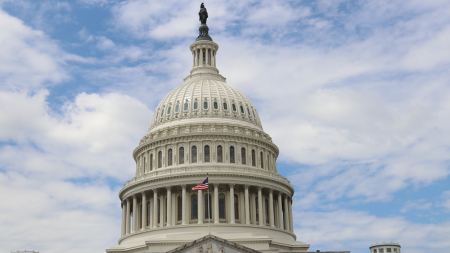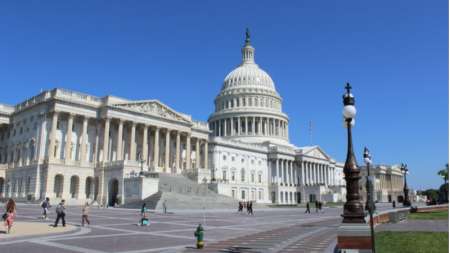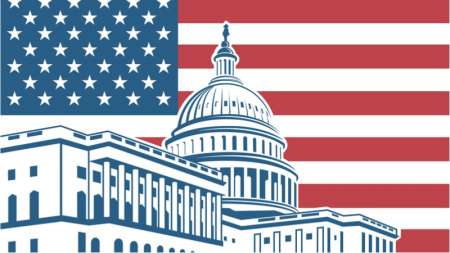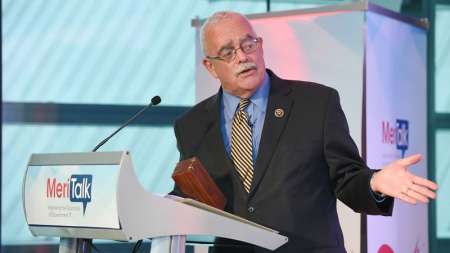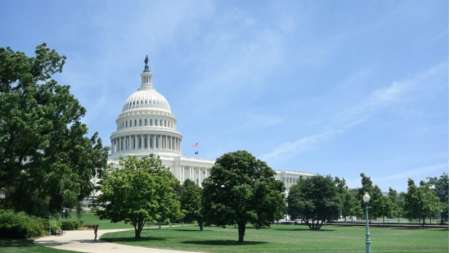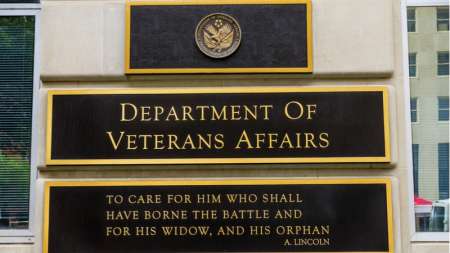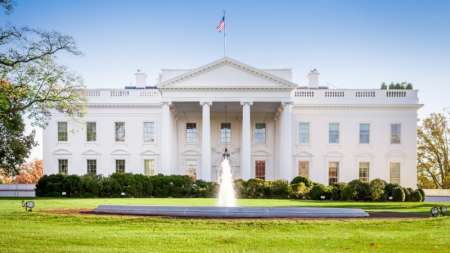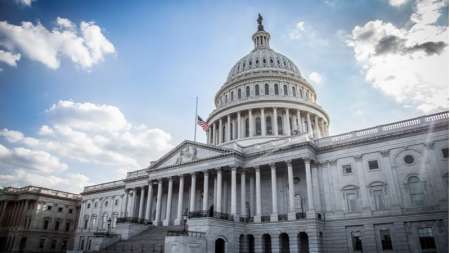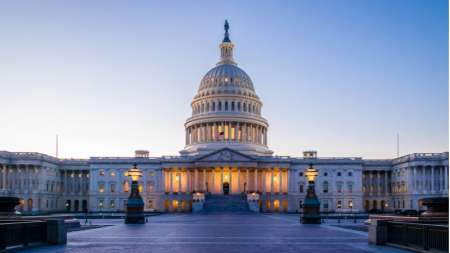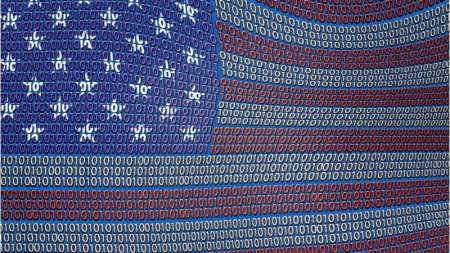A bill introduced in the Senate Nov. 18 by Sens. Catherine Cortez Masto, D-Nev., and Rob Portman, R-Ohio would charge the National Institute of Standards and Technology (NIST) with reporting to Congress on the impact of the Chinese government’s influence in setting global standards for emerging technologies. […]
The House on Nov. 17 approved by voice vote a bill that would provide $750 million of Federal funding grants to support the deployment of Open Radio Access Network (RAN) 5G wireless networks in the U.S. […]
A group of Democratic House members led by Rep. Ro Khanna, D-Calif., this week introduced the 21st Century Jobs Act which would give the Federal government a major role in research and development support for a host of emerging technologies. […]
A bipartisan group of senators and representatives have introduced the Oversight.gov Authorization Act, which would formally authorize the establishment and maintenance of the Oversight.gov website. […]
Senior House Democrats have introduced legislation to reverse President Trump’s controversial executive order that would create a new “Schedule F” classification for Federal employees in policy-making positions and make it easier to hire and fire them. […]
Rep. Gerry Connolly, D-Va., whose northern Virginia congressional district is home to a multitude of Federal government employees, is working on legislation that would aim to overturn last week’s controversial White House executive order that would create a new classification of Federal employees in policy-making positions and make it easier to hire and fire them. […]
President Trump this week signed the US SAFE WEB Extension, which reauthorizes a 2007 law that permits the Federal Trade Commission (FTC) to take action to protect U.S. consumers against cross-border fraud and deception using the internet. […]
A new bill introduced in the House this week would crimp the ability of the White House to curtail Internet access for U.S. citizens, and would put a short time limit on any service curtailment absent approval from Congress. The bipartisan bill offered by Reps. Anna Eshoo, D-Calif., and Morgan Griffith, R-Va., would limit the […]
Chairs of the Congressional Blockchain Caucus Reps. David Schweikert, R-Ariz., and Darren Soto, D-Fla., re-introduced legislation earlier this week to expand government use and the definition of blockchain, ensuring the use of the technology for electronic records and signatures. […]
New bipartisan legislation is aimed at addressing transparency issues at the Department of Veterans Affairs (VA) medical centers (VAMC). […]
On Sept. 30, the House of Representatives approved by voice vote, the Chai Suthammanont Remembrance Act, which is legislation that aims to protect Federal employees from COVID-19. […]
The House on Sept. 30 approved the Modernization Centers of Excellence Program Act, a bill introduced earlier this year by Rep. Ro Khanna, D-Calif., that would require the General Services Administration’s Technology Transformation Services group to establish a Modernization Centers of Excellence (CoE) “to facilitate the adoption of modern technology by executive agencies.” […]
The House of Representative this week voted to approve a collection of bills that aim to improve cybersecurity in the energy sector, inform the use of emerging technologies, and establish R&D plans. […]
Federal legislation to help strengthen the cybersecurity of state and local governments through a Department of Homeland Security grant program passed the House of Representatives on Sept. 30 – with impetus for the legislation coming from across the U.S. in the form of numerous ransomware and other attacks in recent years. […]
The eight members of Congress that comprised the Future of Defense Task Force signed off on the group’s bipartisan work, which was months in the making and recommended several items pertaining to artificial intelligence, cyber, and the technology workforce. […]
The Government Accountability Office said in a report that in order to fully implement the White House’s National Cyber Strategy a “clarity of leadership” is “urgently needed.” […]
MeriTalk caught up with the Center for Democracy & Technology’s Director of the Data and Privacy Project Michelle Richardson, a witness for the committee back in April, to get her take on this week’s Senate hearing, what has changed recently in the privacy world, and the prospects for a Federal privacy standard. […]
A group of Republican senators introduced a bill to create a national data privacy standard, formally bringing forth a bill that had been released as a staff draft almost a year ago. […]
A key Congressman on the House Armed Services Committee spoke in support of three technology bills Friday, expressing optimism with the “bipartisan and bicameral” legislation as the legislative calendar for this session of Congress winds down. […]
During its Sept. 16 business meeting, the Senate Committee on Commerce, Science, and Transportation approved a host of bills, including legislation on spectrum valuation, e-signature modernization, and increased funding for research. […]
Reps. Bill Foster, D-Ill., John Katko, R-N.Y., Jim Langevin, D-R.I. and Barry Loudermilk, R-Ga. on Sept. 11 introduced legislation to improve the nation’s digital identity infrastructure. […]
The Internet of Things (IoT) Cybersecurity Improvement Act of 2020 passed the House today and is moving to the Senate for consideration. The legislation would set a minimum-security standard for all IoT devices purchased by government agencies. […]
A bill introduced to authorize a study of blockchain technology advanced out of the House Energy and Commerce Committee this week. […]
While the House and Senate approved their versions of the annual defense funding bill in July, the top Republican on the House Armed Services Committee said this week that a conference report from House and Senate negotiators that settles differences between the bills won’t likely be produced until after the November elections. […]
With no U.S.-based companies dominating the worldwide market for network equipment that underlies 5G wireless services, and with the U.S. in the midst of a years-long campaign to ban Chinese network equipment makers from U.S. and allies’ markets, perhaps the most important battle for the longer-term future of 5G network infrastructure is gearing up now in and near the halls of power in Washington, D.C. […]
Reps. Cathy McMorris Rodgers, R-Wash., and Bobby Rush, D-Ill., introduced a bill to mandate studies by the Department of Commerce and Federal Trade Commission on emerging technologies such as artificial intelligence, blockchain, and quantum computing. […]
The Cyber Navigators Act, H.R. 8011, would provide additional election-specific IT support to provide help monitoring systems and digesting data from cybersecurity information sharing and analysis centers, said Rep. John Katko, R-N.Y., one of the bills cosponsors. […]
New legislation introduced in the House by Reps. Peter Welch, D-Vt., and Cathy McMorris Rodgers, R-Wash., expands on Senate legislation passed earlier this year to plan for, develop, and grow Internet of Things (IoT) investments. […]
Reps. Scott Peters, D-Calif., Lucy McBath, D-Ga., Anna Eshoo, D-Calif., and Brian Fitzpatrick, D-Pa., introduced legislation August 21 to streamline COVID-19 data collection and management through the Centers for Disease Control and Prevention (CDC). […]
A new survey found that Federal chief data officers are showing signs of progress in implementing their new responsibilities, while challenges to the full scope of their missions remain. […]


